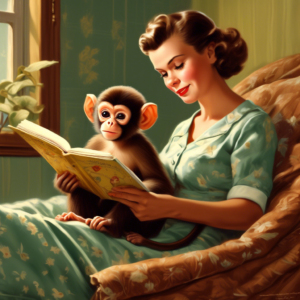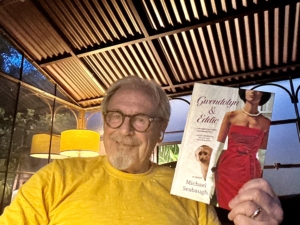Book Club Reading Guide

Spoiler alert. In order to provide reading groups with the most thought-provoking questions, I’ve had to assume you have read Gwendolyn & Eddie to its conclusion. If not, you are at risk for plot spoilers.
Some Questions to discuss~
+ After finishing the book, you’ll realize it’s not just about Gwendolyn and Eddie, nor does it actually feature the wiley monkey in most scenes. Why do you think the author chose this specific title instead of something like “Gwendolyn & Paul Stanley”? How does Eddie contribute meaningfully to the story?
+ As Gwendolyn reflects on her life while on her deathbed, she regrets not embracing certain freedoms, like cursing, having been influenced by her Victorian Grandmother Farnsley’s standards as well as the confines of being an upper middle class, mid-century, mid-south housewife. How does Gwendolyn gradually defy her era’s constraints? Was she successful?
+ The notion of masculinity has seemingly shifted over the past sixty years. Or has it? Gwendolyn’s enters her marriage with a pretty defined view of what constitutes a man: a hero, a man who can hunt a duck, tame a horse, perform surgery, likes his whisky. Do these views evolve for her? How has the broader culture’s perspective changed? Is Paul Stanley an example of the ongoing dialogue about “toxic masculinity”?
+ Gwendolyn often seeks clarification in conversations. Is this a sign of a vulnerability in her character or a reflection of her circumstances, such as societal shifts and possible marital gaslighting? Was she always like this?
+ Gwendolyn could be called a “para-alcoholic” or co-dependent. She has been a reactor, not an actor throughout most of the novel, especially when it comes to relating to her husband’s alcoholism. Why do you think she was like this? Why did it take her so long to emerge from the shackles of being an enabler?
+ Dreams are a recurring theme in the novel: Gwendolyn’s dream of a life of perfect domesticity that gets dashed over the course of the novel, Paul Stanley’s vulnerable admission that he could never safely bring his dreams to his mother. One of the epigraphs quotes John Denver: “Love is the only dream I know.” What is it like to have a dream and then lose it to reality?
+ Some might see Paul Stanley as a narcissist. Did this make him the villain of the story for you? Was he more of a “wounded narcissist” than a more malignant narcissist, devoid of empathy? If you see him as the former, does this alter your opinion of him?
+ Gwendolyn’s story takes place against the backdrop of the profound social changes of the last half of the 20th Century. Gwendolyn worries that she is coming across as a racist when she interacts with Romaine. She has a very complicated reaction to her son’s reveal that he is gay. Do you see Gwendolyn as racist and homophobic?
+ It has been said that men compete (Busby and Paul Stanley) and women learn from each other. (Gwendolyn and Dixie). What do you think?
+ A major them of the book has to do with cages: Fireflies in glass jars; Eddie, a wild animal is kept in a cage; Romaine, encircled by societal racism; Paul Stanley, by his alcoholism and in the end by his stroke; and Gwendolyn in her golden cage of marriage. Discuss.
_________
Invite me~
Like most authors, I love to talk about my book. And I especially appreciate the Book Club model for enjoying literature in community. If your group would like me to join you by Zoom to discuss Gwendolyn & Eddie, feel free to contact me at [email protected]. If at all possible, I will be honored to join.

